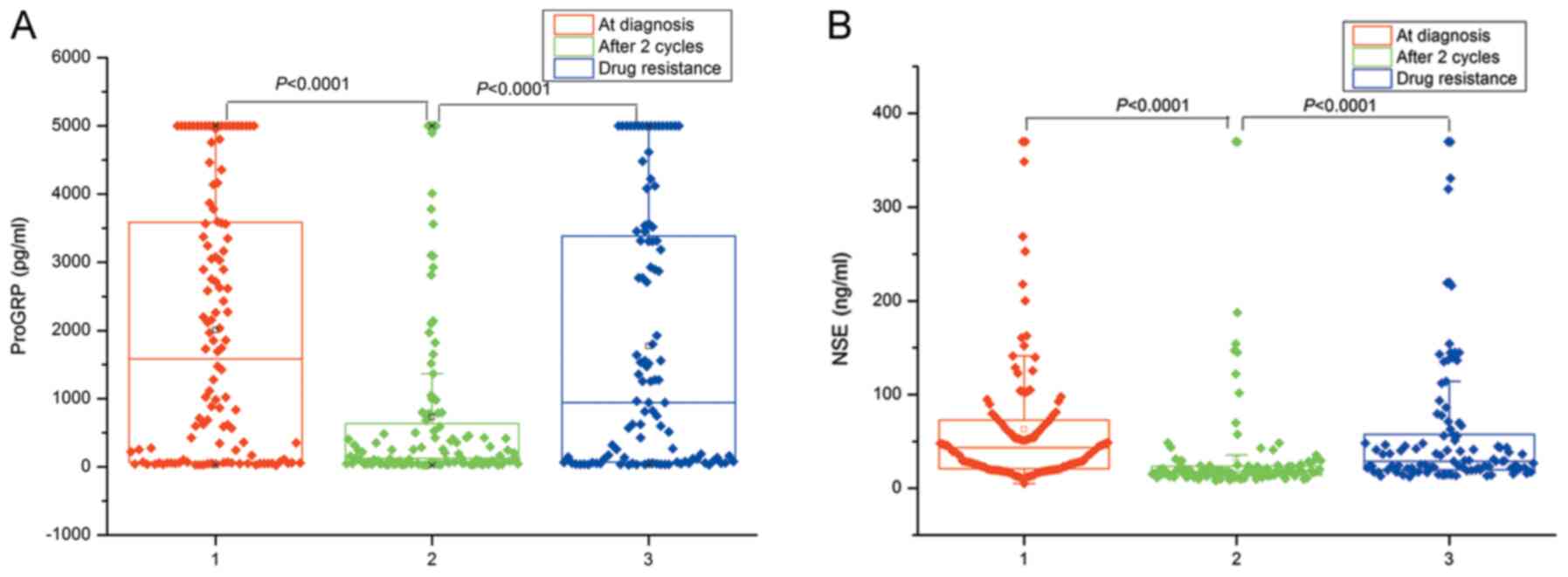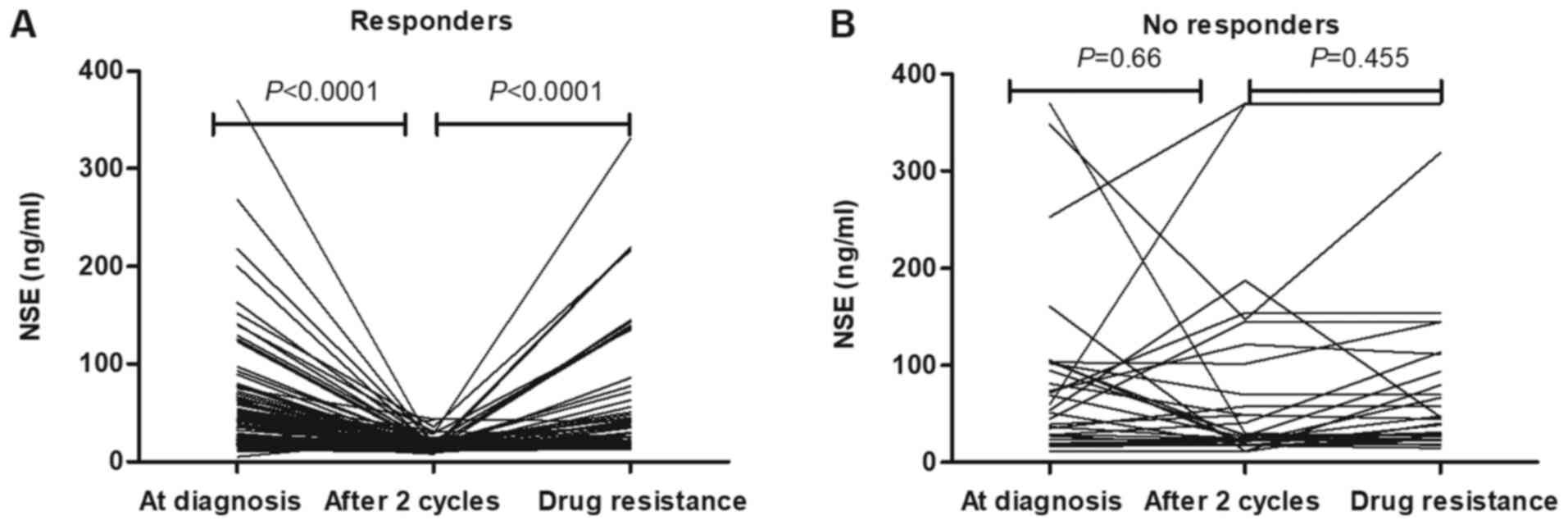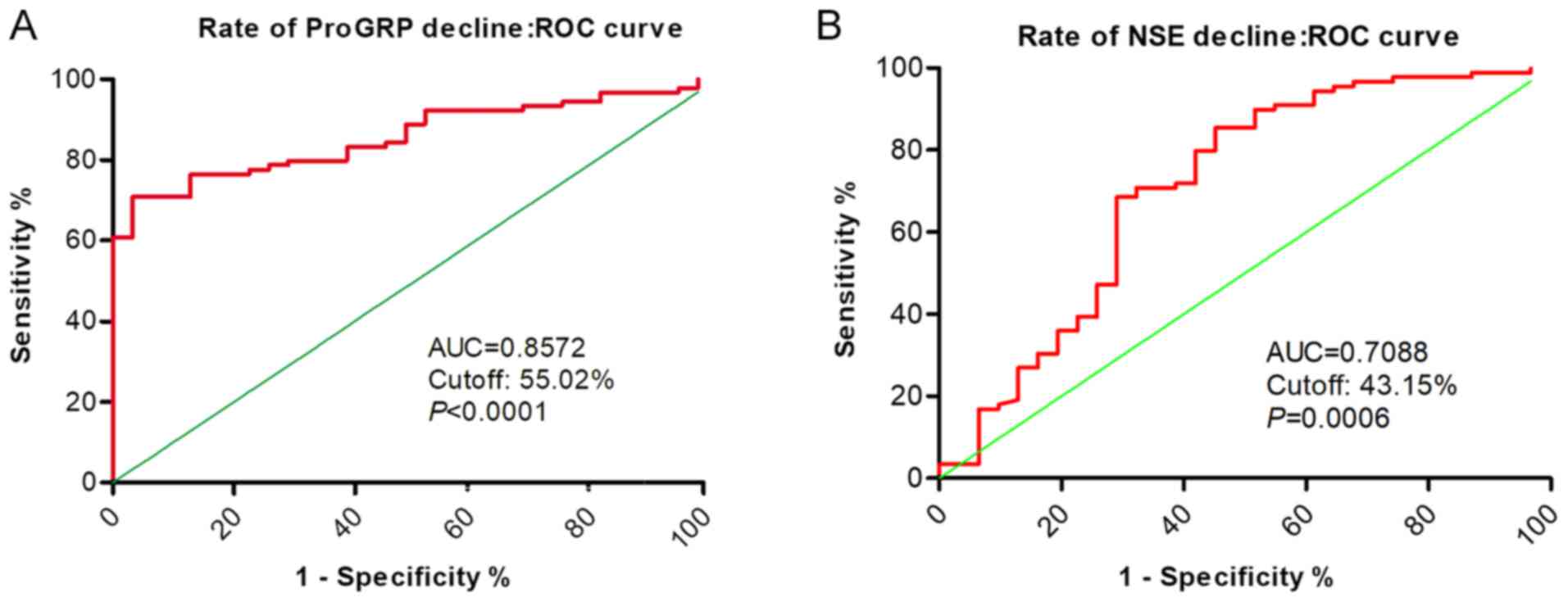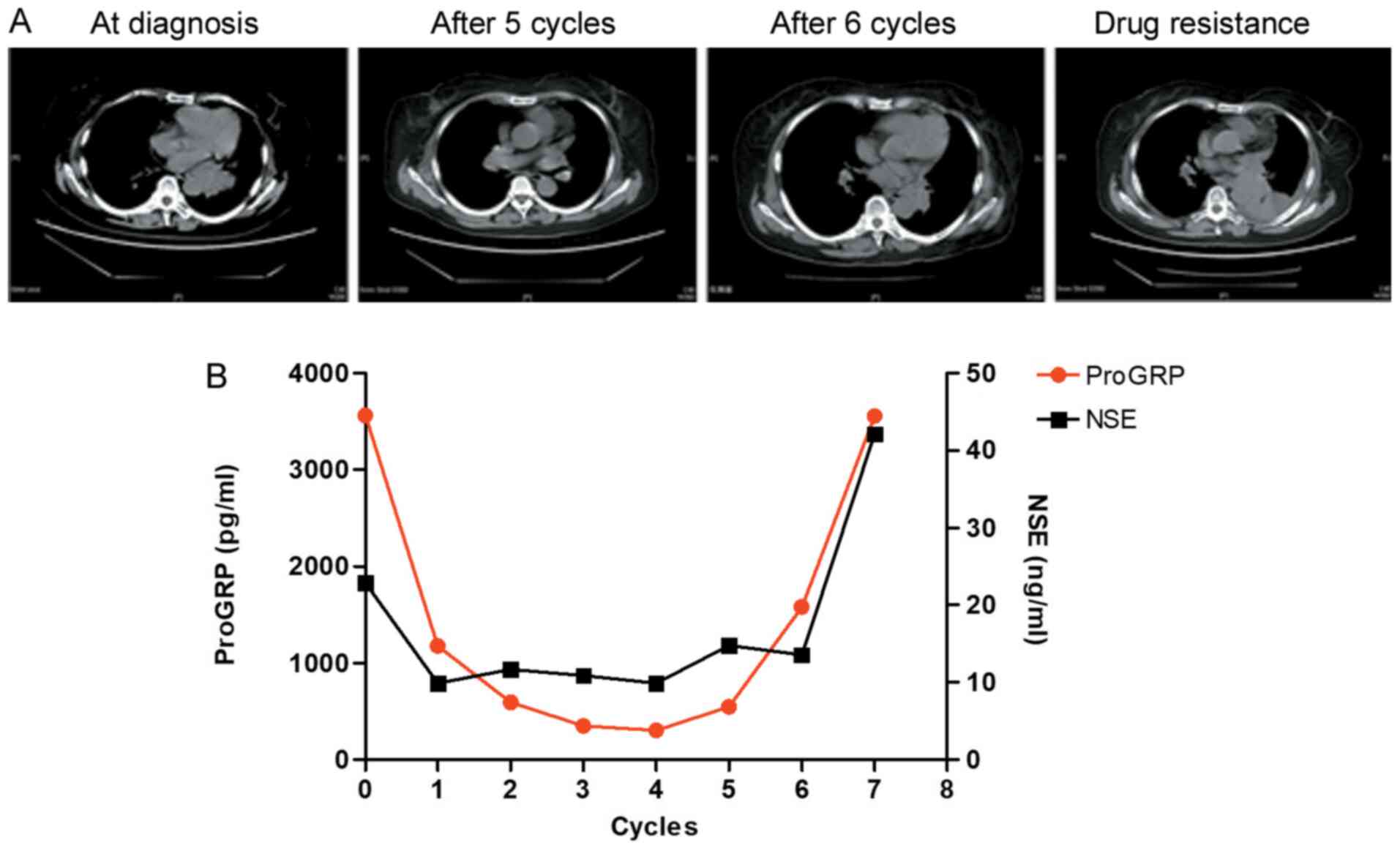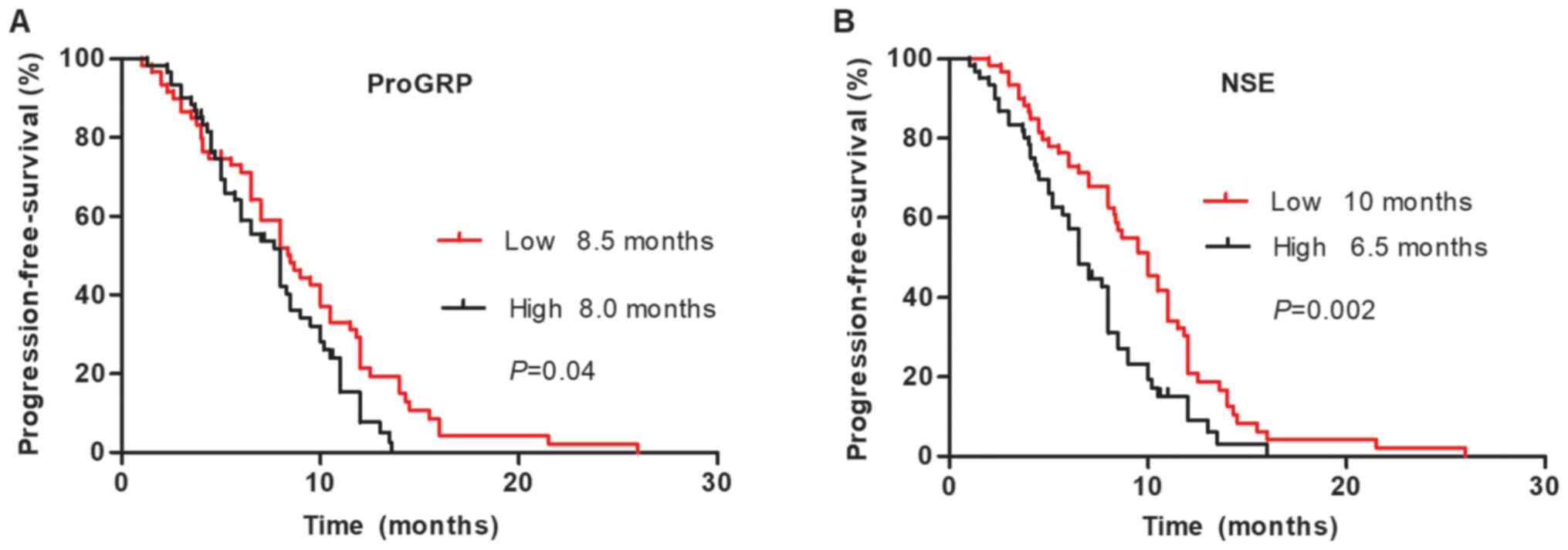|
1
|
Chen W, Zheng R, Baade PD, Zhang S, Zeng
H, Bray F, Jemal A, Yue XQ and He J: Cancer statistics in China,
2015. CA Cancer J Clin. 66:115–132. 2016. View Article : Google Scholar : PubMed/NCBI
|
|
2
|
Kalemkerian GP, Akerley W, Bogner P,
Borghaei H, Chow LQ, Downey RJ, Gandhi L, Ganti AK, Govindan R,
Grecula JC, et al: Small cell lung cancer. J Natl Compr Canc Netw.
11:78–98. 2013. View Article : Google Scholar : PubMed/NCBI
|
|
3
|
Byers LA and Rudin CM: Small cell lung
cancer: Where do we go from here? Cancer. 121:664–672. 2015.
View Article : Google Scholar : PubMed/NCBI
|
|
4
|
Govindan R, Page N, Morgensztern D, Read
W, Tierney R, Vlahiotis A, Spitznagel EL and Piccirillo J: Changing
epidemiology of small-cell lung cancer in the United States over
the last 30 years: Analysis of the surveillance, epidemiologic, and
end results database. J Clin Oncol. 24:4539–4544. 2006. View Article : Google Scholar : PubMed/NCBI
|
|
5
|
Du J, Li Y, Wang L, Zhou Y, Shen Y, Xu F
and Chen Y: Selective application of neuroendocrine markers in the
diagnosis and treatment of small cell lung cancer. Clin Chim Acta.
509:295–303. 2020. View Article : Google Scholar : PubMed/NCBI
|
|
6
|
Wójcik E, Kulpa JK, Sas-Korczyńska B,
Korzeniowski S and Jakubowicz J: ProGRP and NSE in therapy
monitoring in patients with small cell lung cancer. Anticancer Res.
28((5B)): 3027–3033. 2008.PubMed/NCBI
|
|
7
|
Wu XY, Hu YB, Li HJ, Wan B, Zhang CX,
Zhang B, Hu H, Zhang Q, Lv TF, Zhan P and Song Y: Diagnostic and
therapeutic value of progastrin-releasing peptide on small-cell
lung cancer: A single-center experience in China. J Cell Mol Med.
22:4328–4334. 2018. View Article : Google Scholar : PubMed/NCBI
|
|
8
|
McDonald TJ, Nilsson G, Vagne M, Ghatei M,
Bloom SR and Mutt V: A gastrin releasing peptide from porcine
nonantral gastric tissue. Gut. 19:767–774. 1978. View Article : Google Scholar : PubMed/NCBI
|
|
9
|
Stieber P, Dienemann H, Schalhorn A,
Schmitt MU, Reinmiedl J, Hofmann K and Yamaguchi K:
Pro-gastrin-releasing peptide (ProGRP)-a useful marker in small
cell lung carcinomas. Anticancer Res. 19:2673–2678. 1999.PubMed/NCBI
|
|
10
|
Wang H and Qian J: Serum
pro-gastrin-releasing peptide in diagnosis of small cell lung
cancer: A meta-analysis. J Cancer Res Ther. 12 (Suppl)2:C260–C263.
2016. View Article : Google Scholar : PubMed/NCBI
|
|
11
|
Huang Z, Xu D, Zhang F, Ying Y and Song L:
Pro-gastrin-releasing peptide and neuron-specific enolase: Useful
predictors of response to chemotherapy and survival in patients
with small cell lung cancer. Clin Transl Oncol. 18:1019–1025. 2016.
View Article : Google Scholar : PubMed/NCBI
|
|
12
|
Eisenhauer EA, Therasse P, Bogaerts J,
Schwartz LH, Sargent D, Ford R, Dancey J, Arbuck S, Gwyther S,
Mooney M, et al: New response evaluation criteria in solid tumours:
Revised RECIST guideline (version 1.1). Eur J Cancer. 45:228–247.
2009. View Article : Google Scholar : PubMed/NCBI
|
|
13
|
Nordlund MS, Bjerner J, Warren DJ, Nustad
K and Paus E: Progastrin-releasing peptide: Stability in
plasma/serum and upper reference limit. Tumour Biol. 29:204–210.
2008. View Article : Google Scholar : PubMed/NCBI
|
|
14
|
Yang DW, Zhang Y, Hong QY, Hu J, Li C, Pan
BS, Wang Q, Ding FH, Ou JX, Liu FL, et al: Role of a serum-based
biomarker panel in the early diagnosis of lung cancer for a cohort
of high-risk patients. Cancer. 121 (Suppl 17):S3113–S3121. 2015.
View Article : Google Scholar
|
|
15
|
Lv ShP, Wang Y, Huang L, Wang F, Zhou JG
and Ma H: Meta-analysis of serum gastrin-releasing peptide
precursor as a biomarker for diagnosis of small cell lung cancer.
Asian Pac J Cancer Prev. 18:391–397. 2017.PubMed/NCBI
|
|
16
|
Cavalieri S, Morelli D, Martinetti A,
Galli G, Nichetti F, de Braud F and Platania M: Clinical
implications for pro-GRP in small cell lung cancer. A single center
experience. Int J Biol Markers. 33:55–61. 2018. View Article : Google Scholar : PubMed/NCBI
|
|
17
|
Oh HJ, Park HY, Kim KH, Park CK, Shin HJ,
Lim JH, Kwon YS, Oh IJ, Kim YI, Lim SC, et al: Progastrin-releasing
peptide as a diagnostic and therapeutic biomarker of small cell
lung cancer. J Thorac Dis. 8:2530–2537. 2016. View Article : Google Scholar : PubMed/NCBI
|
|
18
|
Liu D, Huang Y, Li L, Song J, Zhang L and
Li W: High neutrophil-to-lymphocyte ratios confer poor prognoses in
patients with small cell lung cancer. BMC Cancer. 17:8822017.
View Article : Google Scholar : PubMed/NCBI
|
|
19
|
Ono A, Naito T, Ito I, Watanabe R, Shukuya
T, Kenmotsu H, Tsuya A, Nakamura Y, Murakami H, Kaira K, et al:
Correlations between serial pro-gastrin-releasing peptide and
neuron-specific enolase levels, and the radiological response to
treatment and survival of patients with small-cell lung cancer.
Lung Cancer. 76:439–444. 2012. View Article : Google Scholar : PubMed/NCBI
|
|
20
|
Wojcik E and Kulpa JK:
Pro-gastrin-releasing peptide (ProGRP) as a biomarker in small-cell
lung cancer diagnosis, monitoring and evaluation of treatment
response. Lung Cancer (Auckl). 8:231–240. 2017.PubMed/NCBI
|
|
21
|
Holdenrieder S, von Pawel J, Dankelmann E,
Duell T, Faderl B, Markus A, Siakavara M, Wagner H, Feldmann K,
Hoffmann H, et al: Nucleosomes, ProGRP, NSE, CYFRA 21-1, and CEA in
monitoring first-line chemotherapy of small cell lung cancer. Clin
Cancer Res. 14:7813–7821. 2008. View Article : Google Scholar : PubMed/NCBI
|
|
22
|
Nisman B, Biran H, Ramu N, Heching N,
Barak V and Peretz T: The diagnostic and prognostic value of ProGRP
in lung cancer. Anticancer Res. 29:4827–4832. 2009.PubMed/NCBIPubMed/NCBIPubMed/NCBIPubMed/NCBIPubMed/NCBIPubMed/NCBIPubMed/NCBIPubMed/NCBIPubMed/NCBI
|
|
23
|
Zhou M, Wang Z, Yao Y, Zhou H, Liu M and
Sun J: Neuron-specific enolase and response to initial therapy are
important prognostic factors in patients with small cell lung
cancer. Clin Trans Oncol. 19:865–873. 2017. View Article : Google Scholar
|















